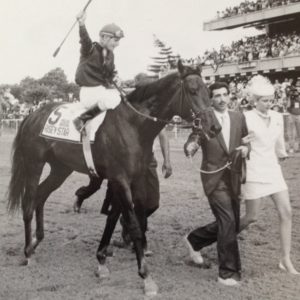
A classic-winning colt continues to be remembered at the Fair Grounds every February with the eponymous Risen Star Stakes, a Kentucky Derby prep race originally called the Louisiana Derby Trial that awards qualification points to the top four finishers (50–20–10–5). But the heights Risen Star’s career would reach while representing his home track of New Orleans was unknown the day before his 1988 Louisiana Derby, for the colt’s participation in the race at that time was in doubt.
Turf writer Bob Fortus reported in the Sunday Times-Picayune on March 13, the day of the race, that Risen Star reared and fell during a bath on Saturday morning, injuring his shoulder and right hock. Louis Roussel III, trainer and co-owner of Risen Star as well as owner of the Fair Grounds track, flew in a chiropractor from Cincinnati Saturday night to tend to the horse.
Risen Star, named “for the Star of Bethlehem and the risen Christ” by Roussel, a devout Roman Catholic, must have had both luck and prayers on his side that enabled him to run that Sunday. The local nuns of the Little Sisters of the Poor were promised a portion of the colt’s winnings from his second race onward, and they prayed rosaries for him throughout his career.
“The Fair Grounds’ star has risen, and his name is Risen Star,” wrote Fortus in “Risen Star powers down the stretch, wins Derby,” for the Times-Picayune.
“Risen Star was alone when he stepped onto the track. The other six horses soon followed from the infield saddling area.
“Risen Star was alone at the wire, too, thanks to a ground-saving ride by [Shane] Romero and a powerful move by Risen Star inside the eighth pole.”
The “tall, stretch-running son of Secretariat” won the Louisiana Derby by 1 ¾ lengths, then two months later captured the Preakness Stakes by 1 ¼ lengths–after finishing third in the Kentucky Derby–though Roussel had been prepared to scratch him in the Preakness up until the last minute if there was more rain at Pimlico.
As promised, the Little Sisters of the Poor received a portion of the Preakness winning purse to support the Mary Joseph Residence for the Elderly in Algiers on the West Bank across the river from New Orleans. “Now the sisters will turn their prayers toward earning Risen Star ‘a good starting position at Belmont,'” Sister Mary Vincent said to Fortus for his column, “Preakness: Louisiana finds its lucky Star.”
At the Belmont post-position draw nearly three weeks later that slated the colt to break from gate 5 at odds of 8–5, his co-owner Ronnie Larmarque entertained the crowd by singing the tune, “Risen Star Salutes New York,” reported Peter Finney for the Times-Picayune. “…He’s going to win the race, just like his grand ‘ol dad, who scored by 31 lengths…”
“As Lamarque sings, as Louie Roussel III prays, the New Orleans entry is being looked on by members of the upper crust New York racing fraternity with detached amusement,” wrote Finney.
“Cajun cooking is one thing. But, when you talk classic thoroughbred races, you don’t talk New Orleans. It’s almost like an intrusion on racing tradition, this invasion from Deep Dixie.
“‘Do you realize,’ asked one Belmont official, ‘if the horse wins, the Little Sisters of the Poor will need an agent?'”
Risen Star eclipsed both his Louisiana Derby and Preakness victories with his 14 ¾ length romp in the Belmont Stakes, though he almost didn’t race in the Belmont either due to a foreleg injury that occurred during a workout in late May. The colt made racing history in what was ranked as the second fastest Belmont behind Secretariat, and now stands as the fourth fastest with the additional victories of Easy Goer (1989) and A.P. Indy (1992).
“The nuns didn’t need any bookie to tell them that Risen Star was the favorite Saturday,” wrote Fortus in “Risen Star runs away with the Belmont.” Said Sister Mary Vincent following the victory, “God can use anything he wants to help his aging and poor and he’s used animals before. This time he chose a horse.”
The Belmont was Risen Star’s swan song, for due to the foreleg injury he was retired in July 1988 with more than $2 million in earnings from eight career wins out of 11 races—three Grade 1’s, one Grade 2 and one Grade 3—while never finishing off the board. The champion was voted as the 1988 Eclipse Award winner for American Champion Three-Year-Old Male Horse.
On the 10th anniversary of his Louisiana Derby win on March 13, 1998, the former warrior on the track succumbed to colic, having been plagued by stomach problems since 1990. Risen Star was buried at Walmac International in Lexington, where he had stood at stud since 1989.
“He was like a saint,” Lamarque said in Fortus’ column, “A champ is dead: Risen Star, at age 13,” which ran the day following the horse’s death. “He was Saint Risen Star. He was an ambassador for this community. He came along at a time when New Orleans really needed something. The Saints were going nowhere. He gave a shot in the arm for this community.”
The devastated Roussel declined to be interviewed. Harold Joseph, Risen Star’s former groom, commented on the news while on the Fair Grounds backstretch. “Risen Star’s stall is still (here) with a plaque above it. Louie said he would never put another horse in it. That horse brought him national prominence.”
The 50th running of the Grade 2 Risen Star Stakes at Fair Grounds Race Course is slated for Saturday, February 19, 2022.
Turf History Times has made a memorial donation in the name of Risen Star to the Grayson-Jockey Club Research Foundation, Inc., to support critical equine research that strives to let horses of all breeds live healthier lives. Learn more about the Foundation’s great work here.
Leave a Reply
You must be logged in to post a comment.